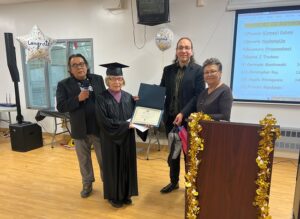Wiikwemkoong celebrates graduating immersion instructors

By Rick Garrick
WIIKWEMKOONG UNCEDED TERRITORY — The Wiikwemkoong Anishinaabemowin Department recently celebrated its third graduating class of 15 Anishinaabemowin immersion instructors on Dec. 1 at the Thunderbird Arena, following earlier training sessions in July and September.
“It was a community celebration honouring and acknowledging the immersion instructors we’ve graduated in our community, so there’s 43 in total,” says Andrew Manitowabi, Anishinaabemowin program manager in Wiikwemkoong. “Most are teachers, some have entered the school systems to be Anishinaabemowin specialists so they’ll be instructing in the schools.”
Manitowabi says the Wiikwemkoong Anishinaabemowin Department also opened up an Immersion House at 61 Amikook St. in Wiikwemkoong on Dec. 20.
“It’s a language nest so some of the graduates will be working with the language nest,” Manitowabi says. “We have newborns, zero-to-two, the parents bring their kids there and it’s all in Anishinaabemowin, so it’s full immersion from 8 (a.m.) to 4 p.m.”
Manitowabi says the program is geared towards working parents but any family can be involved.
“The purpose of it is to create fluent speakers as Anishinaabemowin would be their first language,” Manitowabi says. “It’s great for the families because these kids that will be learning Anishinaabemowin, they will be actually teaching their families, too, how to speak. It’s also to ensure that our language does survive, [so] it’s passed on to future generations.”
Manitowabi says they also have a program from 4-8 p.m. geared towards families with older children or adults wanting to learn Anishinaabemowin.
“We’re only in operation Monday to Friday, but we’re probably going to be expanding into operating seven days a week in the future,” Manitowabi says.
Manitowabi says the Anishinaabemowin Immersion Instructors program was led by Barbara Nolan, the Anishinabek Nation Language Commissioner.
“She is an Anishinaabemowin educator who has been working with languages all her life — she was the head instructor,” Manitowabi says, noting that the graduates had a lot of pride in completing the program. “They’ve been able to break down some of their own internal obstacles because of residual effects from the Residential School and Indian Day School. Back then, they were punished for speaking Anishinaabemowin and now we’re trying to celebrate that gift, so it’s an emotional process.”
Manitowabi says the community also expressed a lot of pride, gratitude, and appreciation to the graduates for taking the time to learn the technical skills during the program.
“The instructors are realizing the importance of always speaking Anishinaabemowin,” Manitowabi says. “There is a lot of hope and a lot of inspiration and a lot of dedication for us to ensure that Anishinaabemowin is passed down for the benefit of future generations.”
Manitowabi says many of the past graduates are working in different positions in the education field in other territories such as Chippewa of the Thames in an e-mail message.
“We would like these credentials to be recognized by post-secondary institutions and the Ontario [College of Teachers],” Manitowabi says in the message. “Our community will affirm who are fluent speakers of our language. The techniques, skills, and lessons taught through the Anishinaabemowin Immersion Instructor program will prepare our speakers to pass on our ancestral language for the benefit of future generations.”

